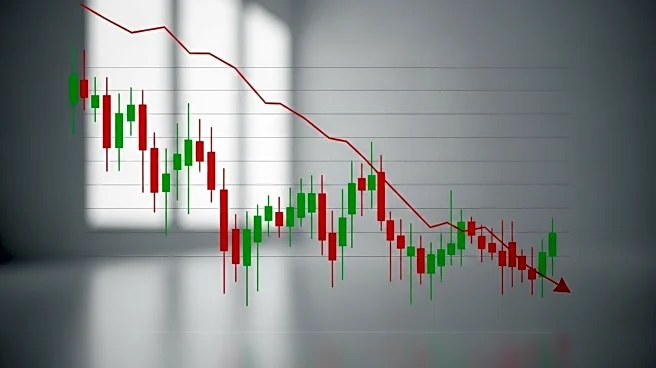What's Happening?
U.S. stock futures experienced a slight decline as investors prepared for the release of August's Personal Consumption Expenditures (PCE) price index report, a key measure of inflation favored by the Federal Reserve. Economists anticipate the data will indicate an increase in inflation. As of late Thursday evening, futures for the Nasdaq 100, Dow Jones Industrial Average, and S&P 500 Index were down by 0.18%, 0.01%, and 0.06%, respectively. The decline in stock futures follows a broader downturn in major U.S. indices, with the S&P 500, Nasdaq Composite, and Dow Jones all closing the session lower by 0.50%, 0.50%, and 0.38%, respectively. Leading the decline were significant AI firms such as Oracle, Meta, and Tesla.
Why It's Important?
The anticipated rise in the PCE price index is significant as it could influence the Federal Reserve's monetary policy decisions, particularly regarding interest rates. An increase in inflation may prompt the Fed to consider tightening monetary policy, which could impact borrowing costs and consumer spending. The decline in major indices and stock futures reflects investor caution and uncertainty about the economic outlook. Companies in the technology sector, which have been leading market gains, are particularly sensitive to changes in interest rates, as higher borrowing costs can affect their growth prospects. The broader market's performance could have implications for investment strategies and economic confidence.
What's Next?
Investors and market analysts will closely monitor the PCE price index report for indications of inflationary trends. Depending on the report's findings, the Federal Reserve may adjust its approach to interest rates, potentially affecting market dynamics. Companies and investors may need to reassess their strategies in response to any shifts in monetary policy. Additionally, the performance of major indices in the coming days will be watched for signs of recovery or further decline, influencing market sentiment and investment decisions.
Beyond the Headlines
The focus on inflation data highlights the ongoing concerns about economic stability and the potential for a shift in monetary policy. The interplay between inflation, interest rates, and market performance underscores the complexity of economic forecasting and the challenges faced by policymakers in balancing growth and stability. The technology sector's sensitivity to interest rate changes also points to broader implications for innovation and investment in emerging technologies.









